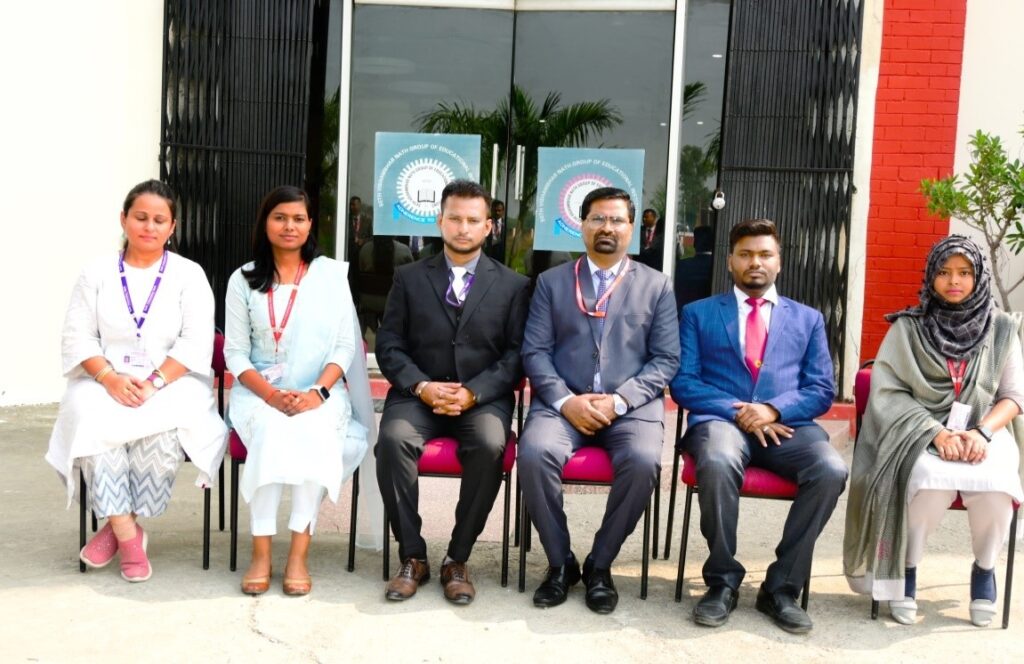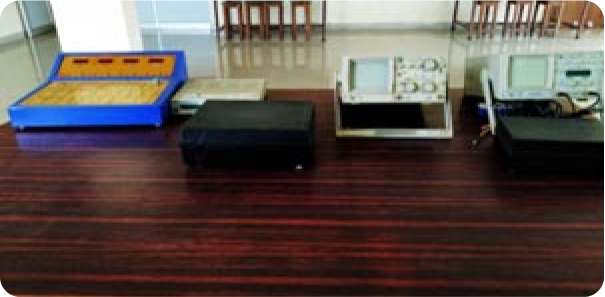
The Department of Biotechnology
The department of Biotechnology offering a 4-year undergraduate program (B. Tech.) in Biotechnology Engineering since 2011. The Department follows the excellent course curriculum of Dr. A.P.J. Abdul Kalam Technical University (AKTU), Lucknow, Uttar Pradesh orienting towards imparting skills in addition to the in-depth coverage of the core discipline. The Department is well known for delivering high-quality education that is implemented via updated curricula. The associated faculties have a remarkable record of research experience in diverse areas of Biotechnology. We encourage our students to appear for the National Level Exam and if required we arrange for remedial classes. Several students of the Department get placed in different Pharma and Biotech companies on the excellent package. Besides, many students opt for higher studies from reputed institutions. Planned training programs on soft-skill and preparative training are offered to enhance students’ competitiveness, placements, and overall personality development.
Newsletter
Achievements
Departmental Society
Institute–Industry Interaction
Vision of the Department:
The department aspires to be a centre of excellence in the field of Biotechnology that train and prepare students as a skilled Biotech engineers who will innovate, invent & spread knowledge and nurture the human resources for the national and global needs.
Mission of the Department:
M-1: To encourage students to learn, practice and develop Biotechnological Tools and Techniques.
M-2: To deliver high quality education ensuring our graduates possess the skills and knowledge needed for successful careers in the relevant field of Biotechnology.
M-3: To develop the socio-economic status of students through fruitful academic programs and entrepreneurship.
M-4: To cultivate a skilled technical learning environment for biotechnological innovations through education, training and strategic partnerships.
Program Educational Objectives
(PEOs)
PEO-1: To impart strong skills in biotechnology and groom students for Industry.
PEO-2: To train students to have virtuous theoretical, scientific, and research knowledge with special emphasis on figuring out, and analyzing needs, to create novel products and solutions for the advancement of society and industry.
PEO-3: To equip students with a sound academic environment, pieces of training, and exposure for providing solutions for real-time problems.
PEO-4: To instill a professional attitude with ethical responsibility, effective communication skills, teamwork, and a multidisciplinary approach and train the students with sound technical skills.
PEO-5: To inculcate a desire for innovations and zeal for starting Biotechnology based entrepreneurship ventures for the betterment of society.
Program Outcomes (POs)
(Engineering Graduates will be able to)
PO-1 Engineering Knowledge: Apply the knowledge of mathematics, science, engineering fundamentals, and an engineering specialization to the solution of complex engineering problems.
PO-2 Problem analysis: Identify, formulate, review research literature, and analyze complex engineering problems reaching substantiated conclusions using first principles of mathematics, natural sciences, and engineering sciences.
PO-3 Design/development of solutions: Design solutions for complex engineering problems and design system components or processes that meet the specified needs with appropriate consideration for the public health and safety, and the cultural, societal, and environmental considerations.
PO-4 Conduct investigations of complex problems: Use research-based knowledge and research methods including design of experiments, analysis and interpretation of data and synthesis of the information to provide valid conclusions.
PO-5 Modern tool usage: Create, select, and apply appropriate techniques, resources, and modern engineering and IT tools including prediction and modeling to complex engineering activities with an understanding of the limitations.
PO-6 The engineer and society: Apply reasoning informed by the contextual knowledge to assess societal, health, safety, legal and cultural issues and the consequent responsibilities relevant to the professional engineering practice.
PO-7 Environment and sustainability: Understand the impact of the professional engineering solutions in societal and environmental contexts, and demonstrate the knowledge of, and need for sustainable development.
PO-8 Ethics: Apply ethical principles and commit to professional ethics and responsibilities and norms of the engineering practice.
PO-9 Individual and team work: Function effectively as an individual, and as a member or leader in diverse teams, and in multidisciplinary settings.
PO-10 Communication: Communicate effectively on complex engineering activities with the engineering community and with society at large, such as, being able to comprehend and write effective reports and design documentation, make effective presentations, and give and receive clear instructions.
PO-11 Project management and finance: Demonstrate knowledge and understanding of the engineering and management principles and apply these to one’s own work, as a member and leader in a team, to manage projects and in multidisciplinary environments.
PO-12. Life-long learning: Recognize the need for and have the preparation and ability to engage in independent and life-long learning in the broadest context of technological change.
Program-Specific Outcomes (PSOs)
After the successful completion of the B.Tech program in “Biotechnology” the graduate will have
PSO-1: Demonstrate expertise in fundamental sciences and foundation courses of engineering.
PSO-2: Demonstrate competence in the application of engineering principles to the biological system.
PSO- 3: Exhibit working knowledge of advanced biological sciences.
PSO- 4: Able to analyze, design and implement sustainable and ethical solutions in the field of Biotechnology.
Message from HoD’s Desk

Dr. Bushra Khatoon
Head of Department
Area of Interest: Genetic Engineering, plant breeding, Fermentation Biotechnology & Molecular biology
This is an amazing time to be exploring Biotechnology Engineering. As the study of life itself, biotechnology is a subject that draws the interest of almost everyone. Biotechnology is a frontline discipline of science & technology with immense potential for the betterment of humankind.
Our Department offering a 4-year undergraduate program (B. Tech.) in Biotechnology Engineering since 2011. The Department follows the excellent course curriculum of Dr. A.P.J. Abdul Kalam Technical University (AKTU), Lucknow, Uttar Pradesh orienting towards imparting skills in addition to the in-depth coverage of the core discipline. The Department is well known for delivering high-quality education that is implemented via updated curricula. The updated curriculum consisting mini/major projects, and industrial visits which is supplementing theoretical knowledge with practical experience. In addition to their teaching assignment, the Department of Biotechnology is actively engaged in the latest research areas of biological engineering such as microbial technology, bioinformatics, animal & plant biotechnology, fermentation technology, pharmaceutical biotechnology, and new drug discovery.
Department of Biotechnology has well-equipped state-of-art laboratories, classrooms, a library, and a highly qualified, experienced, and motivated faculty and supporting staff. The associated teaching staff has a remarkable record of research experience in diverse areas of Biotechnology. We encourage our students to appear for the National Level Exam and if required we arrange for remedial classes. Several students of the Department get placed in different Pharma and Biotech companies on the excellent package. Besides, many students opt for higher studies from reputed institutions. Planned training programs on soft-skill and preparative training are offered to enhance students’ competitiveness, placements, and overall personality development.
I hope with sincere efforts by the faculty staff members and students, the Department will be one of the leading departments and contribute to generating trained manpower capable of taking leading roles in pharmaceutical industries, academia, bio-entrepreneurship, and related research areas.
Welcome to our world; it’s an amazing place to be.
With Best Wishes
Department of Biotechnology
Biotechnology Faculties

Mrs. Shalini Singh Negi
(Assistant Professor)
Area of Interest: Genetic Engineering, Microbiology, Immunology, Biofuels and Alcohol technology..

Mr. Joel James
(Assistant Professor)
Area of Interest: Metabolic Engineering, Cell Biology, Microbiology & Immunology.

Miss. Namrata Verma
(Assistant Professor)
Area of Interest: Bioinformatics, Bioprocess Engineering.

Mr. Rahul Kumar Yadav
(Assistant Professor)
Area of Interest: Metabolic Engineering, Cell Biology, Microbiology & Immunology.

Miss. Khyati Arora
(Assistant Professor)
Area of Interest: Molecular Biology.

Mr.Rajesh Kumar Kushwaha
(Assistant Professor)
Area of Interest: Biochemistry, Enzyme Engineering, Plant Biotechnology, Bioprocess Engineering
Syllabus
Newsletter
Achievements
Departmental Society
Institute–Industry Interaction
Laboratories
Biotechnology is the use of living organisms, cells, and their molecules to create products and technologies that improve human life. Biotechnology has a wide range of applications in industries such as medicine, agriculture, food science, and environmental science.
Biotechnology is used to develop new drugs, vaccines, and gene therapies that can treat diseases and improve human health. In agriculture, biotechnology creates genetically modified crops that are resistant to pests, drought, and disease, and it also provides better yields. In food science, biotechnology creates enzymes, flavourings, and preservatives that enhance the taste and safety of food. In environmental science, biotechnology develops new ways to clean up pollution and create sustainable sources of energy. Few of the labs included in biotechnology are described below:
Enzyme Engineering Lab
Enzyme engineering laboratory is a specialized facility where students manipulate and modify enzymes to enhance their performance, stability, specificity, and other properties for various industrial and biomedical applications.
The laboratory involves the use of molecular biology, biochemistry, and biophysical techniques to study enzymes’ structure, function, and for prospective engineer to understand their properties through genetic manipulation, protein engineering, directed evolution, and other methods.
The laboratory also includes various analytical tools for characterizing enzyme activity, kinetics, and stability. Enzyme engineering has a wide range of applications, including in biocatalysts, biopharmaceuticals, biosensors, and environmental remediation, making it an important field for developing sustainable solutions to many societal challenges.


Techniques in Biotechnology Lab
Techniques in biotechnology lab involve a variety of tools and methods used to manipulate and analyse biological materials.
It includes common techniques like DNA sequencing, PCR (polymerase chain reaction), gel electrophoresis, recombinant DNA technology, and gene editing using CRISPR. These techniques allow students to isolate and manipulate specific genes and proteins, study their functions, and make the prospective engineers to develop knowledge regarding various applications, such as the development of new drugs, vaccines, and agricultural products.
Biotechnology laboratory techniques are constantly evolving, driven by advances in technology, and are critical for advancing our understanding of biological systems and solving real-world problems.

Plant Biotechnology Lab
Plant biotechnology laboratory focuses on studying and controlling plant based DNA and proteins to enhance plant growth, improve crop yields, and develop new plant varieties. The common techniques used in plant biotechnology laboratories include tissue culture, genetic engineering, and gene editing.
Here tissue culture involves growing plant cells and tissues in a sterile environment to produce clones or regenerate whole plants. Students learn Genetic engineering techniques such as agrobacterium-mediated transformation are used to insert or modify specific genes in plant cells to improve their traits. They also enhance their knowledge regarding Gene editing techniques such as CRISPR-Cas9 allow for precise modifications of plant DNA.
Plant biotechnology laboratories are critical for developing sustainable agriculture practices, improving plant resilience to biotic and abiotic stresses, and producing crops with improved nutritional content.


Bioinformatics Lab
Bioinformatics laboratory uses computational methods to analyse and interpret biological data, including genetic and genomic data, protein structures, and biochemical pathways. The common tools and techniques used in bioinformatics include sequence alignment, gene expression analysis, network analysis, and machine learning algorithms. These methods allow researchers to analyse large datasets, identify patterns and relationships between different biological molecules, and develop predictive models for drug discovery and disease diagnosis.
Bioinformatics also plays a crucial role in the development of personalized medicine, as it allows clinicians to analyse an individual’s genetic and medical data to determine the most effective treatment plan. Bioinformatics is a rapidly evolving field, and its techniques and tools are constantly being updated and refined to meet the needs of modern biotechnology research.

Fermentation Technology Lab
A fermentation laboratory is a specialized facility where microorganisms such as bacteria, yeasts, and fungi are grown under controlled conditions to produce useful products such as ethanol, antibiotics, enzymes, and organic acids.
Fermentation is a process in which microorganisms convert sugars or other organic compounds into these valuable products using anaerobic respiration. Fermentation labs are equipped with bioreactors, which are large vessels that provide optimal conditions for microbial growth and product formation. Here students learn about the bioreactors which are equipped with sensors to monitor temperature, pH, oxygen levels, and other parameters to ensure the optimal growth of the microorganisms.
Fermentation labs play a critical role in biotechnology, providing a platform for the development of new products and processes that have a significant impact on the healthcare, agriculture, and energy sectors.


Biochemistry Lab
Biochemistry laboratory is dedicated to studying the chemical processes and molecules that make up living organisms. They employ a range of techniques and instruments to analyse and manipulate biological molecules, such as proteins, enzymes, nucleic acids, and metabolites. These techniques may include protein purification, enzymatic assays, gel electrophoresis, chromatography, and mass spectrometry.
Biochemistry laboratories provide knowledge to students which involve the synthesis and characterization of novel molecules, such as drugs and biomaterials. These results of biochemistry experiments gives insights about the fundamental principles of life and are used to develop new medical treatments, understand disease mechanisms, and improve the quality of food and agricultural products.
Newsletter
Achievements
Departmental Society
Institute–Industry Interaction
Objectives
- To provide student with a broad background in the field of Biotechnology
- To prepare students for solving real time challenges of the society
- Designing experiments, analysing data and summarising information
- To develop effective communication and presentation skills in the students
- To encourage faculty to remain abreast of and inform about the advancements in their respective fields
Opportunities for Biotechnologist
Biotechnologist can have opportunities in following fields:
- Biotech Industry
- Pharma Industry
- Scientific Research Labs
- Biomedical Research
- Forensic Sciences
- Process Engineering
- Water Technology
Biotechnology Labs
- Analytical Techniques in Biotechnology Lab
- Microbiology Lab
- Biochemistry Lab
- Genetics & Molecular Biology Lab
- Immunology Lab
- Enzyme Engineering Lab
- Genetic Engineering Lab
- Bioinformatics-I
- Bioprocess Engineering Lab
- Plant Biotechnology Lab
- Fermentation Biotechnology Lab
- Environmental Biotechnology Lab
- Bioinformatics-II Lab
- Bioseperation & DSP Lab

